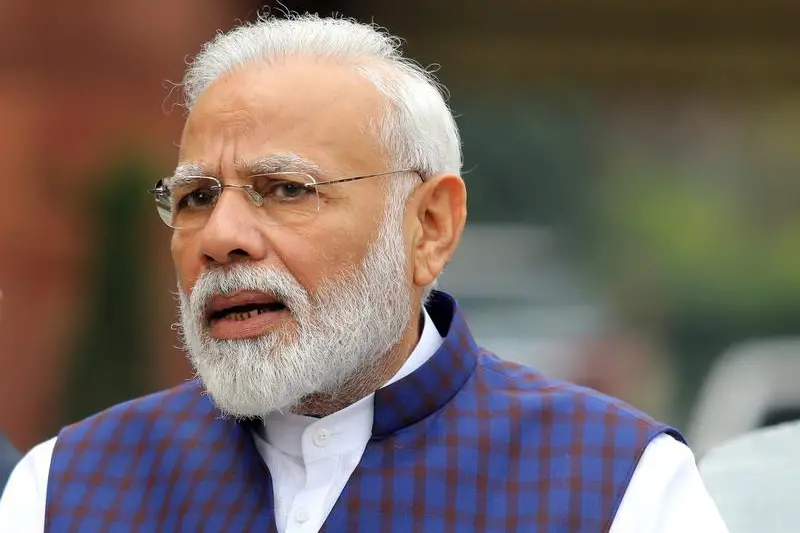PHOTO
To the international community, Narendra Modi is the slightly built, traditionally dressed vegetarian and almost timid figure representing the world’s largest democracy. Many would venture that the greying statesman perfectly represents the immense wisdom of one of the world’s oldest civilizations. At home, however, things could not be more different. Callous and arrogant, the man has embarked on virulent religious majoritarianism, seeking to disenfranchise millions of Indians and airbrush out the country’s Muslim heritage almost entirely.
Singling out 180 million people, or indeed 15 percent of the Indian population, is a mammoth task, if a flawed one — the Nazis struggled in their racist policies toward the 0.75 percent of the German population that was Jewish in 1933. The India Modi represents is not the ambitious BRIC country hoping to lead the world economy; it is instead an increasingly insular and divisive society at the hands of the nationalist Bharatiya Janata Party (BJP). When Amit Shah, Modi’s closest aide, called for a National Register of Citizens (NRC), he not only implemented a new policy but also suggested that people without documentation be expelled from India on the basis of their religion. This is a horrific development in India, which — though constitutionally a secular state — the BJP assumes that Hindus, Sikhs and Buddhists have a right to be in, but Muslims do not. Shah’s NRC is effectively code for Muslim persecution, hence the popular protests since its announcement.
Modi and his racist aides are, however, misguided in their belief that the pursuit of divisive policies will somehow allow India to forget its Muslim past. Muslims ruled India for more than six centuries and contributed in many ways to Indian culture and society. Islamic influences in India have existed for more than a millennium. In fact, it was none other than one of the Prophet Muhammad’s companions, Malik bin Deenar, who came to India’s western coast in the 7th century and built a mosque that still stands today. As ever, Islam inspired many Indians downtrodden by the caste system and restricted to a life of servitude, who were attracted by its teachings of brotherhood and equality.
In the early modern period, Indian Muslims, whose very right to citizenship is today being questioned, mounted some of the most patriotic defenses of their independence and the traditional Indian way of life as the specter of the British Empire drew closer. The role of Shah Waliullah Dehlawi and his family in calling for armed struggle in the early 19th century was critical. Tipu Sultan, the Tiger of Mysore, launched a valiant campaign from his capital at Srirangapatna and ultimately gave his life fighting British forces on the battlefield.
The BJP’s policy in seeking to omit the Muslim contribution to Indian history, and indeed eventually purge them from Indian society altogether, is so misguided and detached from historical reality that it risks destroying what makes India truly great — its rich and diverse makeup.
Modi has expounded the politics of Hindutva put forward by one of his party’s most venerated ideological founders, Vinayak Damodar Savarkar. The ideas of a man who sought second-class status for non-Hindus — and even approved of rape as a political tool — have come into the political mainstream after having been deemed too extreme for decades. The ruling party’s pursuit of such policies not only challenges Indian society, but also the BJP constitution, article two of which states: “The party aims at establishing a democratic state which guarantees to all citizens irrespective of caste, creed or sex… equality of opportunity and liberty of faith and expression.” More importantly, it also infringes the rights accorded to minority communities under articles 25, 26, 29 and 30 of the Indian Constitution.
History has the most pertinent lessons for Modi and his ilk. Under Muslim rule, India was known as the “Golden Bird.” The contribution of the Mughals to literature, art, culture and architecture is unparalleled in India’s glorious history. The BJP would do well to remember that Muslim India was a place of tolerance. Akbar the Great, the ruler of most of South Asia around the turn of the 17th century, rejected bigotry and worked tirelessly to ensure non-Muslims felt at ease in his empire. Ruling a domain that stretched from Afghanistan to Bengal, he implemented an inclusive approach toward non-Muslims, ushering in an era of religious tolerance based on the concept of “sulh-e-kul” (peace to all).
His son Salim, later the Emperor Jahangir, stated that Akbar was “always associated with the learned of every creed.” After conquering Rajputana, Akbar did not forcefully convert Hindus to Islam, but rather accommodated their religious demands by securing their freedom of public prayer and allowing them to build and repair their temples. Especially concerned with the state of Hindus, he made sure to publicly participate in Hindu religious festivals and to order translations of Hindu literature into Persian, the official language of his Mughal state. Arguably one of his greatest legacies, the 1575 Ibadat Khana (House of Worship) served as a place where people of all religions could gather to participate in interfaith dialogue. Akbar’s reign serves as an enduring reminder of how communities in India can coexist and indeed thrive — a goal that will forever elude the demagogues of the BJP.
Modi cannot be allowed to preside over racial strife in India as he once did as the chief minister of Gujarat. The international community must pressure Indian policymakers to adopt less divisive policies. The BJP is tearing apart one of the world’s most wonderfully diverse and promising nations — it cannot be allowed to continue.
• Zaid M. Belbagi is a political commentator, and an adviser to private clients between London and the Gulf Cooperation Council (GCC). Twitter: @Moulay_Zaid
Copyright: Arab News © 2019 All rights reserved. Provided by SyndiGate Media Inc. (Syndigate.info).





















